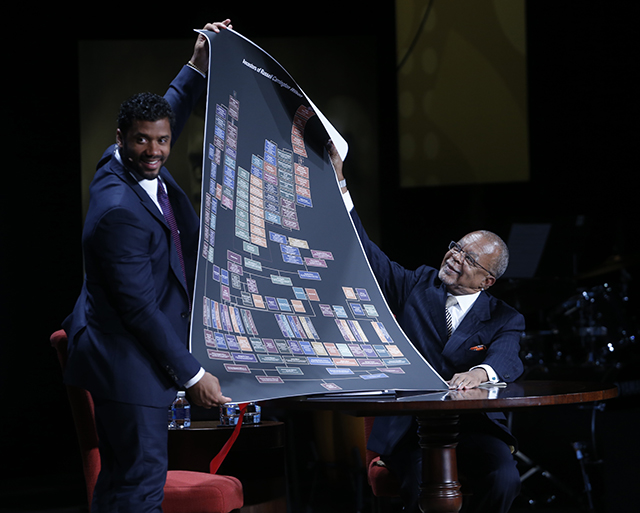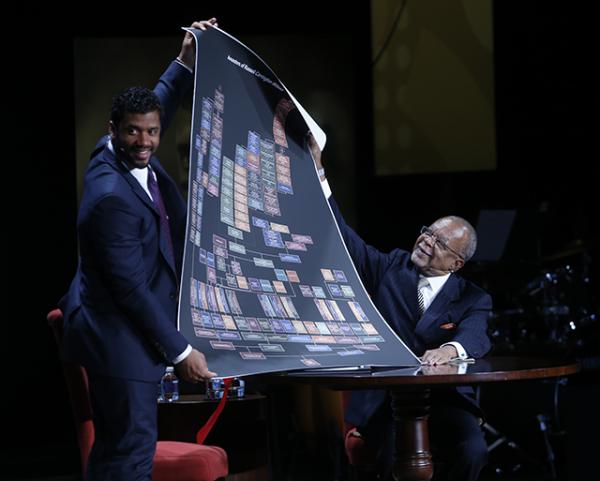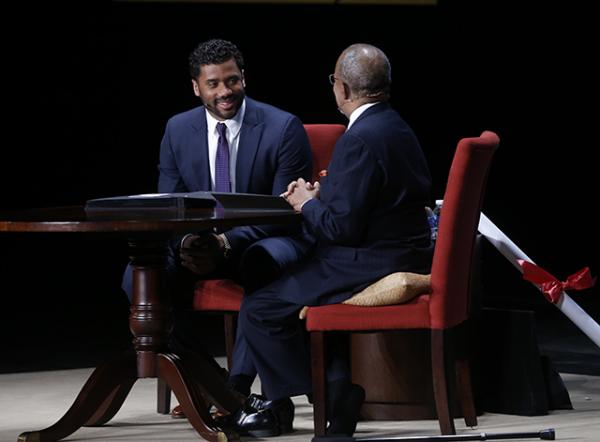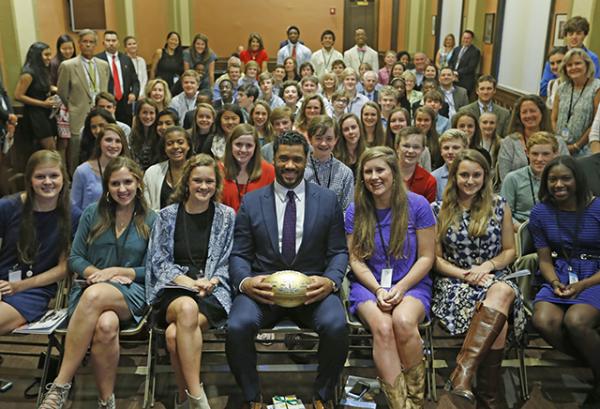KID REPORTERS’ NOTEBOOK
Russell Wilson Traces His Roots


Scholar Henry Louis Gates Jr. (right) presents NFL quarterback Russell Wilson with a copy of his family tree.
On April 2, Seattle Seahawks quarterback Russell Wilson met with historian Henry Louis Gates Jr. at the Richmond Forum in Virginia. The nonprofit organization produces cultural programs each year.
“I don’t really know much about my family heritage,” Wilson told me before the program. That was about to change for the quarterback, who won a Super Bowl ring in 2014.
Gates has hosted Oprah Winfrey and several other notable figures on his PBS show, Finding Your Roots. This was the first time that the scholar, who specializes in African American studies, revealed a guest’s genealogy in front of a live audience.
In the weeks before the event, several tests had been conducted on Wilson’s DNA, including a “Genetic AdMixture,” which allows individuals to map their place(s) of origin.

Wilson discuss his roots with Gates.
A PAINFUL PAST
Gates started by talking about Wilson’s father, Harrison Benjamin Wilson III, who passed away from diabetic complications when Wilson was a student at North Carolina University. “It was a rough time for me,” Wilson said. “My father was very important to me.”
Next came Wilson’s paternal grandfather, Harrison Benjamin Wilson Jr. The quarterback told the audience that his grandfather had been “a big influence on me growing up.” The older Wilson had been denied admission at the University of Kentucky as a young man because of his race.
Gates then led Wilson further down the paternal side of his family tree, introducing him to his great-great-great-great-grandmother, a woman named Charity Southgate. Southgate had been born to a free woman and an enslaved man. Back then, an individual’s freedom was determined by the status of one’s mother, so Southgate was legally free. However, after her mother sent her to live with relatives, she was sold into slavery.
At age 18, Southgate sued for her freedom. It was ruled that while she was legally entitled to her freedom, she would receive it only after 10 years. Eventually, Southgate married a fellow slave. Together, they had five children. When the 10 years were up, Southgate's slave owner still refused to free her. Southgate sued again.
Finally, 23 years after Southgate first sued, she won her court battle, and she and her children were released from slavery. By then, Southgate had saved up enough money to purchase her husband’s freedom.
KNOW YOUR ROOTS
After traveling through Wilson’s entire paternal lineage, which can be traced back to the Bishop of Metz, circa 582 A.D., Gates brought up the athlete’s mother’s side.
“I am most like my mom because of our shared faith and unwavering trust,” Wilson told the audience.

Wilson visits with local students before the Richmond event.
Highlights from Wilson’s maternal lineage include ancestors who are believed to have personally known Nat Turner, a slave who led a rebellion in 1831. Some of Wilson’s ancesters were also among the first African Americans to vote.
At the end of the program, Gates presented Wilson with a paper copy of his entire family tree and the results of his DNA testing. Wilson learned that his family was not, as he had been told, from South Africa. Rather, Wilson’s heritage is Pan-African, which means that his roots stretch across the entire continent of Africa.
“I want to encourage others to find out more about their heritage,” Wilson said. “To know where you’re going, you have to know where you came from.”
